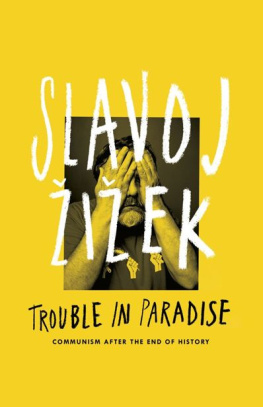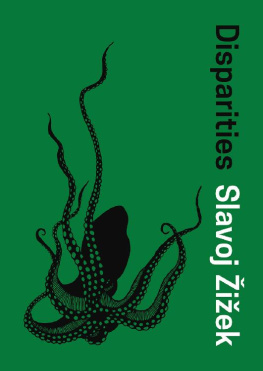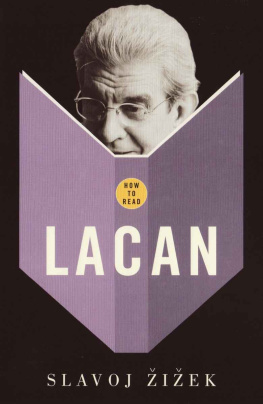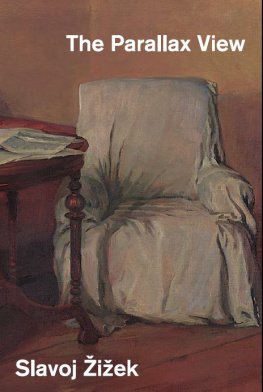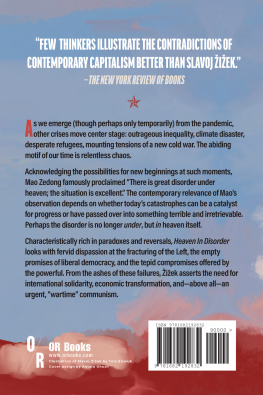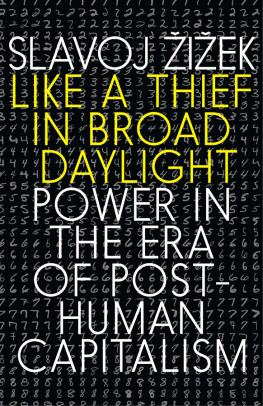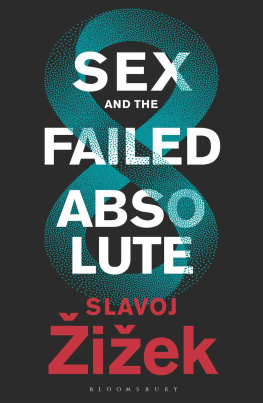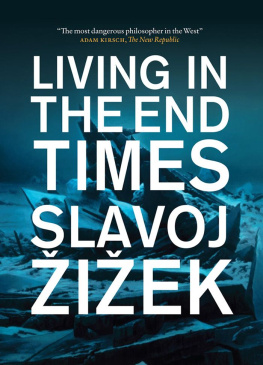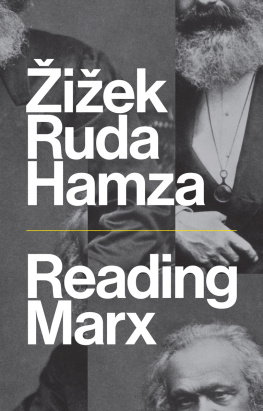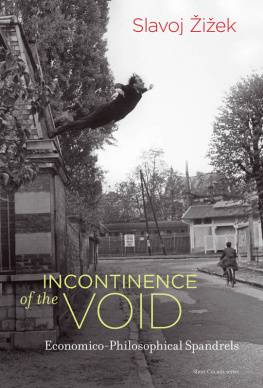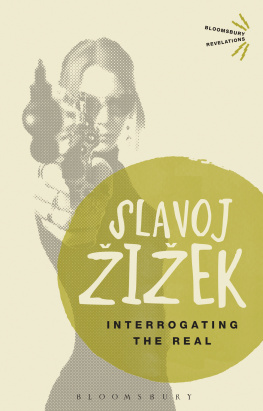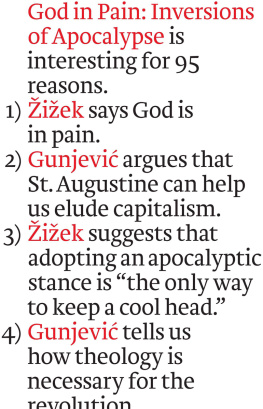Slavoj Zizek - Trouble in Paradise: From the End of History to the End of Capitalism
Here you can read online Slavoj Zizek - Trouble in Paradise: From the End of History to the End of Capitalism full text of the book (entire story) in english for free. Download pdf and epub, get meaning, cover and reviews about this ebook. year: 2014, publisher: Allen Lane, genre: Politics. Description of the work, (preface) as well as reviews are available. Best literature library LitArk.com created for fans of good reading and offers a wide selection of genres:
Romance novel
Science fiction
Adventure
Detective
Science
History
Home and family
Prose
Art
Politics
Computer
Non-fiction
Religion
Business
Children
Humor
Choose a favorite category and find really read worthwhile books. Enjoy immersion in the world of imagination, feel the emotions of the characters or learn something new for yourself, make an fascinating discovery.
- Book:Trouble in Paradise: From the End of History to the End of Capitalism
- Author:
- Publisher:Allen Lane
- Genre:
- Year:2014
- Rating:4 / 5
- Favourites:Add to favourites
- Your mark:
- 80
- 1
- 2
- 3
- 4
- 5
Trouble in Paradise: From the End of History to the End of Capitalism: summary, description and annotation
We offer to read an annotation, description, summary or preface (depends on what the author of the book "Trouble in Paradise: From the End of History to the End of Capitalism" wrote himself). If you haven't found the necessary information about the book — write in the comments, we will try to find it.
Trouble in Paradise: From the End of History to the End of Capitalism — read online for free the complete book (whole text) full work
Below is the text of the book, divided by pages. System saving the place of the last page read, allows you to conveniently read the book "Trouble in Paradise: From the End of History to the End of Capitalism" online for free, without having to search again every time where you left off. Put a bookmark, and you can go to the page where you finished reading at any time.
Font size:
Interval:
Bookmark:


To Jela a messiah who arrived just in time.
Trouble in Paradise, Ernst Lubitschs 1932 masterpiece, is the story of Gaston and Lily, a couple of happy burglars robbing the rich, whose life gets complicated when Gaston falls in love with Mariette, one of their wealthy victims. The lyrics of the song heard during the opening credits provide a definition of the trouble alluded to, as does the image that accompanies the song: first we see the words trouble in, then beneath these words a large double bed appears, and then, over the surface of the bed, in large letters, paradise. So paradise is the paradise of a full sexual relationship: Thats paradise / while arms entwine and lips are kissing / but if theres something missing / that signifies / trouble in paradise. To put it in a brutally direct way, trouble in paradise is Lubitschs name for il ny a pas de rapport sexuel.
So where is the trouble in paradise in Trouble in Paradise? There is a fundamental ambiguity about this key point. The first answer that imposes itself is this: although Gaston loves Lily as well as Mariette, the true paradisiacal sexual relationship would have been the one with Mariette, which is why it is this relationship that has to remain impossible and unfulfilled. This lack of fulfilment confers on the films end a touch of melancholy: all the laughter and boisterousness of the films last minute, all the merry display of the partnership between Gaston and Lily, only fills in the void of this melancholy. Does Lubitsch not point in this direction with the repeated shot of the big empty double bed in Mariettes house, a shot which recalls the empty bed during the films credits? There is, however, also the possibility of the exactly opposite reading:
The beauty of this reading is that paradisiacal innocence is located in the glamorous and dynamic life of crime, so that the Garden of Eden is equated with the underworld while the call of high-society respectability is equated with the snakes temptation. However, this paradoxical reversal is easily explained by Gastons sincere and raw outburst, the first and only one in the film, enacted with no elegance or ironic distance, after Mariette refuses to call the police when he tells her that the chairman of the board of her company has for years been systematically stealing millions from her. Gastons reproach is that, while Mariette is immediately ready to call the police when an ordinary burglar like him steals from her a comparatively small amount of money or wealth, she is ready to turn a blind eye when a member of her own respectable high class steals millions. Is Gaston here not paraphrasing Brechts famous statement, What is the robbing of a bank compared to the founding of a bank? What is a direct robbery like those of Gaston and Lily compared to the theft of millions in the guise of obscure financial operations?
There is, however, another aspect that has to be noted here: is Gastons and Lilys life of crime really so full of glamour and risks? Beneath the surface glamour of their thievery, arent the two of them a quintessential bourgeois couple, conscientious professional types with expensive tastes yuppies before their time. Gaston and Mariette, on the other hand, are the really romantic pair, the adventurous and risk-taking lovers. In returning to Lily and lawlessness, Gaston is doing the sensible thing returning to his station, as it were, opting for the mundane life he knows. And he does so with full regret,
G. K. Chesterton noted how the detective story
keeps in some sense before the mind the fact that civilization itself is the most sensational of departures and the most romantic of rebellions When the detective in a police romance stands alone, and somewhat fatuously fearless amid the knives and fists of a thieves kitchen, it does certainly serve to make us remember that it is the agent of social justice who is the original and poetic figure, while the burglars and footpads are merely placid old cosmic conservatives, happy in the immemorial respectability of apes and wolves. The romance of the police is based on the fact that morality is the most dark and daring of conspiracies.
Is this not also the best definition of Gaston and Lily? Are these two burglars not living in their paradise before the fall into ethical passion? What is crucial here is the parallel between crime (theft) and sexual promiscuity: what if, in our postmodern world of ordained transgression, in which the marital commitment is perceived as ridiculously out of time, those who cling to it are the true subversives? What if, today, straight marriage is the most dark and daring of all transgressions? This, exactly, is also the underlying premise of Lubitschs Design for Living: a woman leads a satisfied, calm life with two men; as a dangerous experiment, she tries single marriage; however, the attempt miserably fails, and she returns to the safety of living with two men, so that the overall result can be paraphrased in the above-quoted Chestertons words:
marriage itself is the most sensational of departures and the most romantic of rebellions. When the couple of lovers proclaim their marriage vows, alone and somewhat fatuously fearless amid the multiple temptations to promiscuous pleasures, it does certainly serve to make us remember that it is marriage which is the original and poetic figure, while cheaters and participants in orgies are merely placid old cosmic conservatives, happy in the immemorial respectability of promiscuous apes and wolves. The marriage vow is based on the fact that marriage is the most dark and daring of sexual excesses.
A homologous ambiguity is at work in the basic political choice we are confronting today. Cynical conformism tells us that emancipatory ideals of more equality, democracy and solidarity are boring and even dangerous, leading to a grey, overregulated society, and that our true and only paradise is the existing corrupted capitalist universe. Radical emancipatory engagement starts from the premise that it is the capitalist dynamics which are boring, offering more of the same in the guise of constant change, and that the struggle for emancipation is still the most daring of all ventures. Our goal is to argue for this second option.
There is a wonderful French anecdote about a British snob visiting Paris, who pretends to understand French. He goes to an expensive restaurant in Quartier Latin and, when asked by the waiter, Hors doeuvre?, replies: No, Im not out of work, I earn enough to be able to afford to eat here! Any suggestions for an appetizer? The waiter proposes raw ham: Du jambon cru? The snob replies: No, I dont believe it was ham I had the last time here. But OK, lets have it again and what about the main course? Un faux-filet, peut-tre? The snob explodes: Bring me the real one, I told you I have enough money! And quickly, please! The waiter reassures him: Jai hte de vous servir!, to which the snob snaps back: Why would you hate to serve me? I will give you a good tip! Finally the snob gets the point that his knowledge of French is limited; to repair his reputation and prove that he is a man of culture, he decides, upon his departure late in the evening, to wish the waiter good night in Latin, since the restaurant is in
Font size:
Interval:
Bookmark:
Similar books «Trouble in Paradise: From the End of History to the End of Capitalism»
Look at similar books to Trouble in Paradise: From the End of History to the End of Capitalism. We have selected literature similar in name and meaning in the hope of providing readers with more options to find new, interesting, not yet read works.
Discussion, reviews of the book Trouble in Paradise: From the End of History to the End of Capitalism and just readers' own opinions. Leave your comments, write what you think about the work, its meaning or the main characters. Specify what exactly you liked and what you didn't like, and why you think so.

